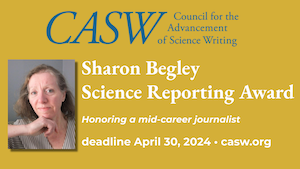Record attendance at 8th WCSJ Conference
Last summer, 807 participants from 77 countries met in Helsinki, Finland, to attend the 8th World Conference of Science Journalists (WCSJ). Over the course of five days, more than 50 sessions, workshops, and plenary talks together with social events ranging from cocktails aboard an Ice Breaker to traditional Finnish dancing on an open-air stage took place.
The Helsinki conference titled “Science Journalism: Critical Questioning in the Public Sphere” was held on the University of Helsinki campus. Pre-conference workshops ranged from data journalism to investigative reporting to examining the current standing of the profession.
Themes of the three main conference dates were:
- Our common values
- Our exciting work
- Our vulnerable world
Plenary sessions addressed journalistic ethics, the rising power of blog networks, investigative science journalism, and the essential importance of mainstream media. Workshops and panels explored everything from reporting on violence, to telling a good narrative story, to writing about uncertainty in scientific context. Many drew standing-room-only crowds.
This was by many measures the most social-media connected WCSJ, followed online by thousands of Twitter users. Also a worldwide audience took advantage of live webcasts, at times outnumbering those seated in the Great Hall of the University of Helsinki, where the sessions took place.
The following are reports from SciDev.Net on a few representative workshops.
Covering science in totalitarian countries
By Andrea Small Carmona
It’s been more than 20 years since the fall of the Soviet Union, but the impact the totalitarian government had on the way science journalism is done remains a current issue.
At a session entitled “Science Journalism in Totalitarian Countries: The Impact to a Current Time,” Blanka Jergovic, a journalist at Croatian Radio, analyzed the criteria used back then.
“The government used to say that it was socially responsible to spread the so-called successes of the socialist ideology about science,” he said. “It was a way to make propaganda and try to convince people of the idea of development.”
We also learned that during oppressive times, science information could be a vehicle for freedom. While growing up, Marina Huzvarova, current editor-in-chief of Academic Bulletin (Czech Republic), listened to a scientific show on the radio that would find creative ways to avoid the censorship controls imposed by the Soviet Union.
While the majority of the speakers were from Eastern Europe, there are many other examples in the world that can fit into this model of struggle. The shadow of government oppression against science information can be also felt today in many countries around the globe. For example, in some nations in Latin American and the Middle East, freelancers and journalists have reported having a hard time gaining access to official sources and documents detailing investments in science and technology.
One of the reasons for this is that science news can make a government look good or bad because of its connection to the notion of progress.
So what can we do today? That was my question for the panelists at the end of their discussion.
“We need to build better networks that help us put some pressure on these repressive governments. I believe the World Federation of Science Journalists should have a stronger influence in these cases,” said James Cornell, president of the International Science Writers Association. “Together we can make a louder voice against these abuses.”
Science journalists of the world, unite. Governments with a tendency to interfere in scientific coverage are, unfortunately, not yet a thing of the past.
Andrea Small Carmona is a science journalist based in Germany.
Climate change reporting in the Pacific
By Mico Tatalovic
The Maldives has become a media darling through reports on the impacts of climate change on small island developing states. But this misses out on many others — most notably in the Pacific — that are at the forefront of bearing impacts of climate change, but receive little coverage on the issues they face.
Climate change reporting in and about the Pacific island region is pretty dismal, according to an analysis of local and U.K. newspapers, presented at WCSJ2013.
With just a handful of journalists working on newspapers in the tiny island nations, there is little time to devote to writing about the impacts of climate change and how people adapt to it, said Lagipoiva Cherelle Jackson, editor of IISD Reporting Services, in Samoa.
Yet, she said, if a story gets written, it will probably be included in the newspaper, as the paper has to be filled — and with stretched staff, stories are valuable.
But the challenge is how to get overworked and underpaid journalists to write about climate change, a difficult issue to understand and report on comprehensively. The lack of detailed, local data on climate change also hampers the chances of such stories being written in the region.
Internet access is expensive, with an hour of surfing sometimes costing as much as an hour’s pay in the region, which adds another barrier to writing stories about climate that often need detailed investigation to get the facts and data right.
Expensive Internet access also means that online news is not as influential as print in the region, she said.
So how do you get more climate change reporting in the region? One way is to encourage foreign media to write about the issue in the Pacific, which can then be picked up by local newspapers. Other recommendations include providing more training to journalists and editors in the region.
Lagipoiva Cherelle Jackson paper: “Staying afloat in Paradise Reporting Climate Change in the Pacific”
Mico Tatalovic is a new editor at SciDev.net, based in the UK.
Science journalism to export: A matter of context
By Andrea Small Carmona
Attending an international conference is always a great opportunity to find out more about how colleagues from all over the world do their job. The skills, tools and focus can vary widely, depending on the social and political context, infrastructure, educational opportunities, and economic circumstances that science journalists face.
These differences were discussed during the session “Around The Globe,” moderated by SciDev.Net’s Latin America and Caribbean coordinator Luisa Massarani.
Massarani gave an overview of the Global Science Journalism Report — conducted by SciDev.Net, the London School of Economics, and the Museum of Life, in Brazil — which profiles science journalists around the world: who they are, where they live, their training background, and what circumstances they work in.
Panelist Angela Posada-Swafford, a Colombian journalist currently residing in the United States, shared her experience as a freelance science writer for some of the biggest magazines in Latin America, Spain, and the U.S.
“I receive many calls from colleagues who want to work as freelancers, but their ideas keep being rejected by publications,” she said. “If that has happened to you, you need to ask yourself: ‘Do I know the publication I want to write for? Do I know its audience?’ Very often, the answer is no. We don’t get the jobs because sometimes we want to collaborate with media in a different country and don’t know its context, and some other times because there is a lack of training on writing science.”
Her comments sparked a heated debate about the necessity of formal training in science communication for journalists.
Shiow Chin Tan, a journalist from The Star in Malaysia, said: “I think training is overrated. In countries like mine, where those options are not available, the idea of writing about science starts with curiosity and passion. For me, that’s all you need.”
But Bernard Appiah, a science journalist from Ghana who is currently based in the U.S., said that training is necessary.
Another journalist, from Jordan, said that the best thing is to have a balance. “You need to be passionate about science, but training is also important because we can’t forget we have a responsibility [to] our societies. In my region, if you don’t write about politics you’re invisible. But science can always find its way. Right now a good topic to discuss is the use of chemical weapons in Syria. Without proper training, you can cause chaos,” she said.
From this session, I learned that when it comes to writing about science in a globalized world, context is everything. Connecting with your colleagues from other latitudes gives you the chance to understand your own situation better, and establishing networks helps to increase the visibility of what is being done in your region.
Andrea Small Carmona is a science journalist based in Germany.
WCSJ2013 webcasts
- Opening Ceremony
- Plenary Talk by Hans Rosling: A Fact-based World View — People, Money & Energy
- What About Ethics?
- Critical Questioning In The Sphere — The Role Of Science Journalism
- The Poisoner’s Guide to Life (and Communicating Chemistry)
- The Rise of the Science Blog Network: Lessons from All Corners of the Internet
- Climate Change — A Very Hot Topic
- Closing Plenary — New Horizons
NASW members on Helsinki program The following NASW members participated in WCSJ2013 as session producers, moderators, and speakers.
- Deborah Blum
- Maryn McKenna
- Curtis Brainard
- Ivan Oransky
- Estrella Burgos
- Kathleen Raven
- Jim Cornell
- Jamie Rosen
- Rose Eveleth
- Cristine Russell
- Phil Hilts
- Anne Sasso
- Seema Kumar
- Fabio Turone
- Betsy Mason
- Bora Zivkovic
- Angela Posada-Swafford
South Korea to host WCSJ2015
The 9th World Conference of Science Journalists will take place in Seoul, South Korea. The June 2015 conference will be hosted by the Korean Science Writers Association (KSJA). Dates to be announced.
KSJA, founded in 1984, is made up of reporters specializing in science and technology, information technology, and medical science in domestic daily newspapers, broadcasting companies, and news agencies.
Providing leadership for WCSJ2015 is newly elected World Federation of Science Journalists President Chul Joong Kim. A physician who earned a master’s degree in journalism while completing his medical studies, Dr. Kim became a full-time medical reporter in 1999, after 10 years of medical practice. He is a senior staff writer for Chosun Ilbo, South Korea’s largest and oldest newspaper.
WCSJ2015 will mark the first time the conference has been in Asia since 1992, when it was held in Japan.
(source: WFSJ)
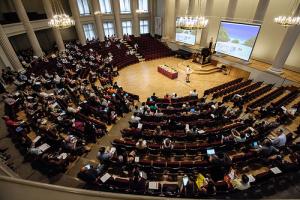
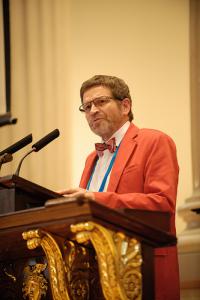

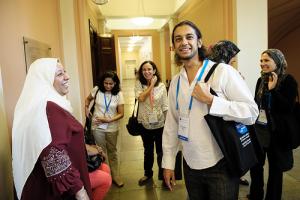
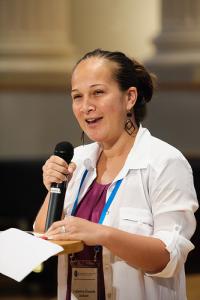
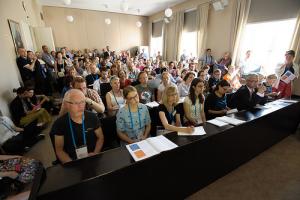
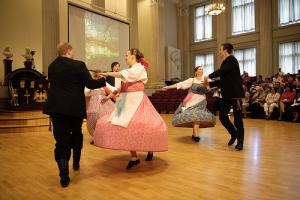
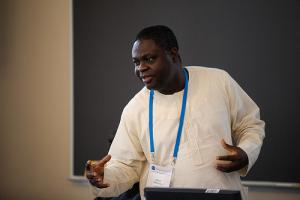
.png)

